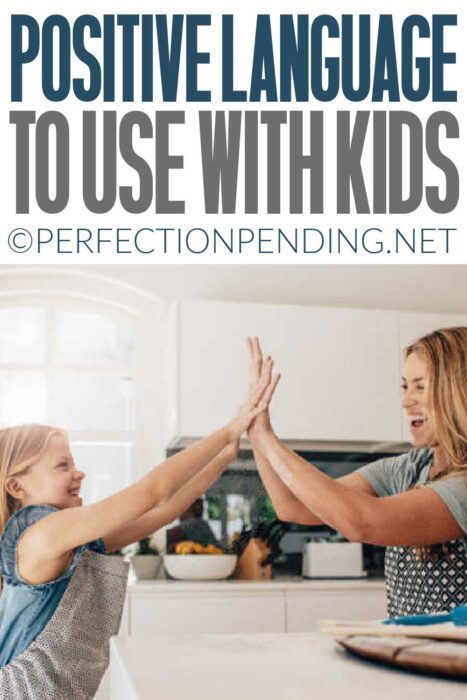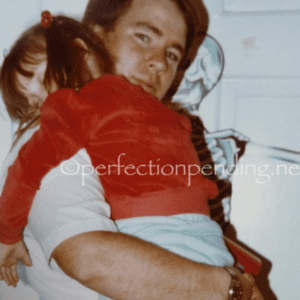Positive language matters with kids. As a parenting technique positive language instead of negative language offers quite a few benefits for your family, including better behavior and more confident children.
What is Positive Language?
To put it simply, positive language is switching your words from negative to positive. As parents, we are always teaching our kids that words matter – because they do!
Positive language inspires, encourages, and is helpful. Words like don’t, can’t, and won’t aren’t used in positive language. Most negative phrases can simply be swapped to put a more positive spin on any circumstance.
Why is Positive Language Important with children?
In a world full of can’ts and don’ts and no’s, positive language allows your child to focus on what they can do.
This encourages them to develop a positive mindset in general, as well as provides them with a clear idea of your expectations. Incorporate positive language into your parenting and start seeing the benefits in your own child.
If you can incorporate positive language into your parenting, your kids will feel empowered by your expectations instead of weight down by them. They will be able to face problems head on with the confidence that they can solve the problem themselves.
So, how do you start using positive language?
First, shift your language from don’t to do.
Positive language is all about shifting the focus and relaying your expectations in a clear and concise way.
Start using more positive language when speaking to your child by thinking about what it is you want them to do instead of what you don’t want them to do.
It’s easy to blurt out, “Stop running!” However, this only tells a child what you don’t want them doing, and it’s akin to telling someone not to think of an elephant in the room.
The brain is wired to immediately think of nothing but that elephant. Set your child up for success and enjoy better behavior by being clear about what you want your child to be focusing on instead. It might surprise you how well kids listen when you use positive language in every day life.
Second, use short, instructional positive language phrases with kids.
According to modern research, we can only remember a few things at a time. LiveScience estimates the average is four things at a time with a maximum of seven.
When talking to your child, it’s good to keep this in mind. Not only are they developing the skills to remember rules and expectations long-term, but they are also developing those short-term memory skills, too.
Instead of presenting your child with a long list of instructions, use short phrases instead. Break down complex tasks into steps and check-in with your child along the way.

Positive Language Examples To Use With Kids
Positive language is less about changing how you parent than adjusting the way you talk to your child. The language we use to communicate with our kids directly impacts how their perceive their world.
The more positively we communicate with them, the most positively they will perceive the world.
Here are positive language phrases to use with your kids that will make an impact.
You simply need to use this negative words to positive words list to help you make a shift in your positive parenting.
Stop running! → Walk, please.
Don’t hit your sister! → Use nice touches.
Don’t get up from the table yet. → Stay at the table until we’re all finished eating.
Stop yelling! → Use your inside voice, please. We can still hear you without yelling.
Don’t whine! → Please use your big kid words.
Don’t get upset! → It’s OK to feel sad.
Don’t get out of your bed! → I know you can stay in your bed all night.
You can’t have that! → This is for grown ups.
Don’t be mean to your brother! → Be polite to your brother.
Do I need to separate you? → I think you need a break.
It’s not hard. → I know you can do hard things.
Stop being angry! → You’re allowed to be upset.
Don’t give up. → Keep going! You can do it.
Don’t…. → I like it when…
Did you know there are positive body language examples you can use with your kids, too?
When talking with kids, it’s important to use positive body language too so that they know you are there to help, encourage, and inspire them.
Here are a few examples of positive language with your body you can use while parenting:
Kneel down to their level.
Make eye contact.
Look happy to see them when they enter a room.
Lean in, give them a hug, or open your arms to them when they are upset.
Let them sit with you on the couch.
Give 8 second hugs.
Use a controlled tone of voice.
Smile at your kids when they’re talking to you, or try to relax your face.
Keep arms relaxed and open – not crossed.
Another way to use positive language with kids is through complimenting them.
Kids need to feel encouraged, loved, and seen. That’s the key to positive parenting! But, even as adults, we like to be recognized for our accomplishments.
Kids are the same way, they love to hear positive things they are getting right way more than things that they need to improve. Try using these 17 positive parenting techniques to get started.
In addition, use positive phrases with your kids regularly that also compliment them like,
I’m proud of you!
You’re so brave.
I saw when you shared with your sister, good job!
You are trying really hard and I can see that.
Thank you for helping.
You are a fast learner!
I don’t know about you, but positive language is not something that comes naturally so I’m excited to start some of these techniques with my own kids. The good thing is that it’s never too late to help your kids become more confident, empathetic humans.
Using positive language with kids is the secret to doing just that.







Leave a Reply